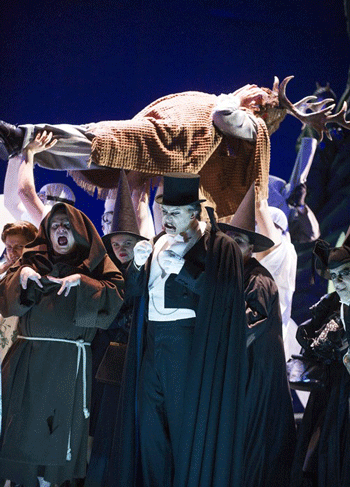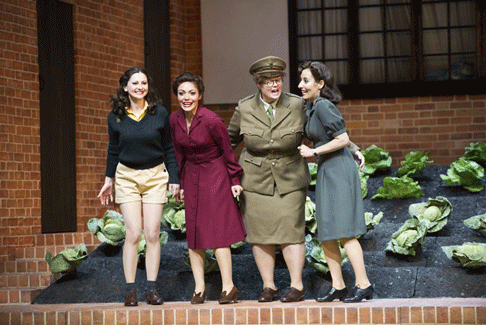
22 May 2013
Verdi’s Falstaff at Glyndebourne
Richard Jones’ 2009 production of Verdi’s Falstaff translates the action from the first Elizabethan age to the start of the second.
English Touring Opera are delighted to announce a season of lyric monodramas to tour nationally from October to December. The season features music for solo singer and piano by Argento, Britten, Tippett and Shostakovich with a bold and inventive approach to making opera during social distancing.
This tenth of ten Live from London concerts was in fact a recorded live performance from California. It was no less enjoyable for that, and it was also uplifting to learn that this wasn’t in fact the ‘last’ LfL event that we will be able to enjoy, courtesy of VOCES8 and their fellow vocal ensembles (more below …).
Ever since Wigmore Hall announced their superb series of autumn concerts, all streamed live and available free of charge, I’d been looking forward to this song recital by Ian Bostridge and Imogen Cooper.
Although Stile Antico’s programme article for their Live from London recital introduced their selection from the many treasures of the English Renaissance in the context of the theological debates and upheavals of the Tudor and Elizabethan years, their performance was more evocative of private chamber music than of public liturgy.
Evidently, face masks don’t stifle appreciative “Bravo!”s. And, reducing audience numbers doesn’t lower the volume of such acclamations. For, the audience at Wigmore Hall gave soprano Elizabeth Llewellyn and pianist Simon Lepper a greatly deserved warm reception and hearty response following this lunchtime recital of late-Romantic song.
For this week’s Live from London vocal recital we moved from the home of VOCES8, St Anne and St Agnes in the City of London, to Kings Place, where The Sixteen - who have been associate artists at the venue for some time - presented a programme of music and words bound together by the theme of ‘reflection’.
'Such is your divine Disposation that both you excellently understand, and royally entertaine the Exercise of Musicke.’
‘And there was war in heaven: Michael and his angels fought against the dragon; and the dragon fought and his angels, And prevailed not; neither was their place found any more in heaven … that old serpent … Satan, which deceiveth the whole world: he was cast out into the earth, and his angels were cast out with him.’
There was never any doubt that the fifth of the twelve Met Stars Live in Concert broadcasts was going to be a palpably intense and vivid event, as well as a musically stunning and theatrically enervating experience.
‘Love’ was the theme for this Live from London performance by Apollo5. Given the complexity and diversity of that human emotion, and Apollo5’s reputation for versatility and diverse repertoire, ranging from Renaissance choral music to jazz, from contemporary classical works to popular song, it was no surprise that their programme spanned 500 years and several musical styles.
The Academy of St Martin in the Fields have titled their autumn series of eight concerts - which are taking place at 5pm and 7.30pm on two Saturdays each month at their home venue in Trafalgar Square, and being filmed for streaming the following Thursday - ‘re:connect’.
The London Symphony Orchestra opened their Autumn 2020 season with a homage to Oliver Knussen, who died at the age of 66 in July 2018. The programme traced a national musical lineage through the twentieth century, from Britten to Knussen, on to Mark-Anthony Turnage, and entwining the LSO and Rattle too.
With the Live from London digital vocal festival entering the second half of the series, the festival’s host, VOCES8, returned to their home at St Annes and St Agnes in the City of London to present a sequence of ‘Choral Dances’ - vocal music inspired by dance, embracing diverse genres from the Renaissance madrigal to swing jazz.
Just a few unison string wriggles from the opening of Mozart’s overture to Le nozze di Figaro are enough to make any opera-lover perch on the edge of their seat, in excited anticipation of the drama in music to come, so there could be no other curtain-raiser for this Gala Concert at the Royal Opera House, the latest instalment from ‘their House’ to ‘our houses’.
"Before the ending of the day, creator of all things, we pray that, with your accustomed mercy, you may watch over us."
The doors at The Metropolitan Opera will not open to live audiences until 2021 at the earliest, and the likelihood of normal operatic life resuming in cities around the world looks but a distant dream at present. But, while we may not be invited from our homes into the opera house for some time yet, with its free daily screenings of past productions and its pay-per-view Met Stars Live in Concert series, the Met continues to bring opera into our homes.
Music-making at this year’s Grange Festival Opera may have fallen silent in June and July, but the country house and extensive grounds of The Grange provided an ideal setting for a weekend of twelve specially conceived ‘promenade’ performances encompassing music and dance.
There’s a “slide of harmony” and “all the bones leave your body at that moment and you collapse to the floor, it’s so extraordinary.”
“Music for a while, shall all your cares beguile.”
The hum of bees rising from myriad scented blooms; gentle strains of birdsong; the cheerful chatter of picnickers beside a still lake; decorous thwacks of leather on willow; song and music floating through the warm evening air.

Richard Jones’ 2009 production of Verdi’s Falstaff translates the action from the first Elizabethan age to the start of the second.
In Ultz’s recreation of post-war Windsor — a fitting setting for a year in which we celebrate the 60th anniversary of Queen Elizabeth II’s coronation — suburban mock-Tudor has replaced the genuine article but it’s a familiar world populated, much as in the historic past, by down-on-their-luck aristocrats and aspiring social climbers. There are nods forwards as well as backwards: the regimented cabbage plots amid the middle-class semis call to mind that prior ‘age of austerity’, when the ‘Dig For Victory’ mentality was as common as ‘Grow Your Own’ economising is today.
We begin in a rather genteel, wood-panelled local saloon bar, The Garter Inn; a portrait of George VI and an extravagantly antlered stag’s head oversee proceedings — a reminder of the class tensions and cuckoldry which will disturb the bourgeois complacency. Centre-stage sprawls Falstaff, ardently typing amorous missives, audaciously and insouciantly adding to his alcohol tab, and flamboyantly issuing commands to his senseless sidekicks, Bardolfo and Pistola.
Laurent Naouri’s Sir John is imposingly wide of girth — thanks to an impressive fat-suit — and generously resounding of voice. His authoritative bellow vanquishes complaints from his snivelling underlings; with beguiling tone, he serenades and courts the ladies. There is no doubting his haughty bumptiousness and Naouri emphasises his essential aristocratic dignity. But, at times this Falstaff is overly curmudgeonly, aggrieved that others do not recognise his ‘nobility’ — an anachronistic note in 1950s England — and his irritability and crabbiness do not endear him. Naouri is light on his feet, despite the prodigious abdominal encumbrance, and can neatly execute a dainty flounce. But, while the voice is sweet and enticing, this Falstaff lacks a certain wicked sparkle in the eye and the debonair charm that might win a feminine heart regardless of his physical decrepitude. Falstaff should be both dignified and vulgar, both arrogant and aware of his own coarseness and comic crassness — he should laugh at himself, so that we can laugh with him.
Part of the problem is Jones’ uncharacteristic lack of attention to comic detail and gesture; there are a few neat touches — the faux leave-taking courtesies of Ford and Falstaff, the obsequious pleading for forgiveness of the perfidious Bardolfo and Pistola, the tidal wave which bursts through the Fords’ front window when Falstaff tumbles from the window ledge and belly-flops into the Thames — but most of the audience laughter was prompted by the surtitles rather than the stage action itself (excepting the feline wriggles of the furry puppet adorning the Garter’s bar-top). The lengthy pauses between scenes, necessitated by some hefty scene-shifting, further diminished the comic briskness. The sets themselves are neat and credible, and troupes of rowing eights and girl guides add to the period feel — although they have little relevance to the drama itself. Three such scouts cross-stitch the local panorama across the front cloth before curtain-up, but it’s stretching things somewhat to ask us to imagine that they have won their needlepoint brownie badges creating a tapestry screen of Windsor Castle to adorn Alice Ford’s morning room. The latter is rather sparsely decorated, leaving few opportunities for chaotic concealment in what should be a farcical man-hunt for the lascivious Falstaff during his lecherous assignation in Act 2.
 Elena Tsallagova, Ailyn Perez, Susanne Resmark and Lucia Cirillo
Elena Tsallagova, Ailyn Perez, Susanne Resmark and Lucia Cirillo
The huge oak in the final scene is impressively anthropomorphic and, swathed in unnatural colours by lighting designer Mimi Jordan Sherin, casts eerie, dancing shadows. But, the scene is poorly choreographed, the stage overly cluttered, and the ghoulish, lurid Halloween costumes — bought, presumably, at the high-street Joke Shop depicted in the previous scene — sported by the boy scouts and brownies are at odds with the Shakespearean mood of enchantment and magic. More ‘trick or treat’ than Midsummer Night’s Dream.
Ultimately, these flaws in the staging do not overly trouble us, for there is not a single weak link in the cast. Making her Glyndebourne debut, American soprano Ailyn Pérez was a self-possessed and spirited Alice Ford. Never histrionic but always secure in her self-belief, Pérez’ golden voice soared lyrically; at times slyly coy, she commanded the stage with ease. Susanne Resmark as Mistress Quickly, purposefully attired in an Auxiliary Territorial Service uniform, demonstrated masterly comic timing, particularly in her scenes with Falstaff — tongue-firmly-in-cheek, she relished the ironic resonances of the mocking salutation, ‘with respect’.
Russian baritone Roman Burdenko was a proud, indignant Ford; Falstaff may be the one with the title, but Burdenko’s powerful yet elegant delivery left no doubt about his own sense of entitlement. In this production, Fenton is a GI, and the Italian tenor, Antonio Poli exuded freshness and optimism, although he was surpassed in graceful airiness by Elena Tsallagova as Nanetta, whose angelic faerie supplication in Act 3 was the musical highlight of the evening. Lucia Cirillo was a fiery Meg; Graham Clark as Dr Caius, and Colin Judson and Paolo Battaglia — Bardolfo and Pistola respectively — completed the fine line-up.
Conducting much of the score from memory, Mark Elder led the Orchestra of the Age of Enlightenment in a crisp but warm account, alert to every detail and unfailingly conjuring deft musical humour even when the stage action was less buoyant. The sombre, slightly melancholic tone of the natural horns coupled with the darker gut string timbre, made for an unusual but convincing musical colour. There was much fine playing and the instrumentalists fully captured the conviviality and essential geniality of the work; they richly deserved their ovation.
Claire Seymour
Click here for a podcast relating to this production.
Cast and production information:
Falstaff: Laurent Naouri; Alice Ford: Ailyn Pérez; Ford: Roman Burdenko; Meg Page: Lucia Cirillo; Mistress Quickly: Susanne Resmark; Nannetta: Elena Tsallagova; Fenton: Antonio Poli; Dr Cajus: Graham Clark; Bardolfo: Colin Judson; Pistola: Paolo Battaglia; Conductor Mark Elder; Orchestra of the Age of Enlightenment; The Glyndebourne Chorus; Director Richard Jones; Revival Director Sarah Fahie; Designer Ultz; Lighting Designer Mimi Jordan Sherin. Glyndebourne Festival, Sunday, 19th May 2013.